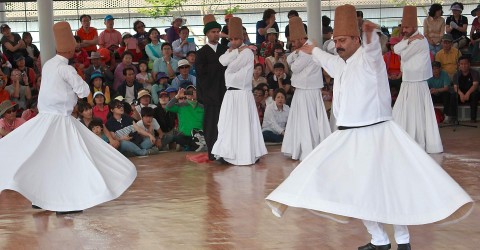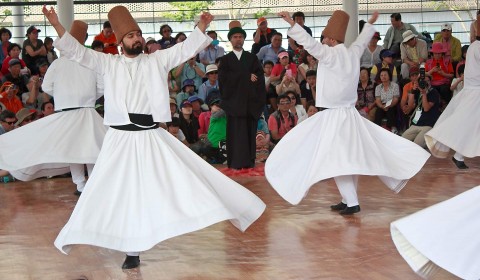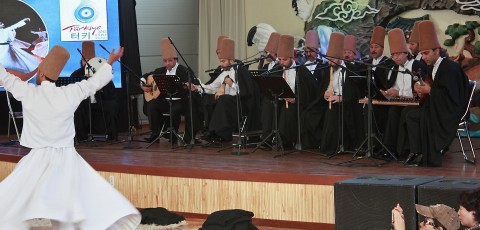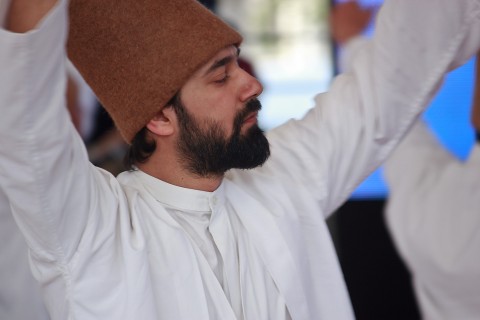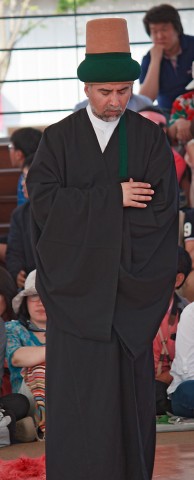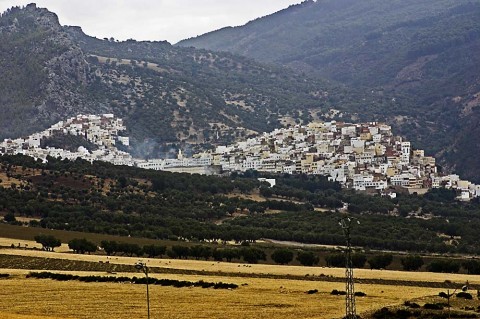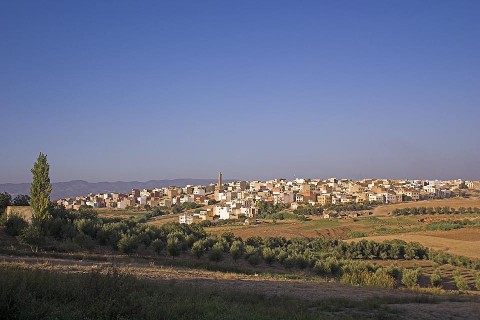The day of the Feast of Sacrifice, Wednesday, was beautiful. I sat with Saif and his family on the roof of their apartment in the bright sun, waiting for the butcher to arrive. I even got a bit of sunburn. The fellow was an hour or so late, so we sat around talking–Saif, his younger brother, sister, mother, Saif’s friend, his brother’s friend and me. We ate oranges and a dish that tasted a lot like macaroni and cheese, only it was made of bread and milk and baked in the oven. Really quite tasty, as was all of the food I ate the past few days. Try some of the Moroccan recipes here; you won’t be disappointed.

Finally the butcher arrived. He had already had 10 appointments that day. The sheep was well taken care of before, as it was given water to drink and salt to eat. After wrestling the reluctant animal to the ground, it was hogtied and the butcher then sliced its throat, the blood flowing out on the rooftop, though not as much as I expected. It was all very quick, and I don’t think the animal suffered much, thankfully. Muslims feel a lot of respect and gratitude for the sheep, though there was no religious ritual involved. After it was decided that the sheep was truly dead, Saif used a bicycle pump to inflate air into the carcass through a cut made in the leg. It started to puff up like a Macy’s Thanksgiving Day balloon; this was necessary to make the separation of the skin from the meat easier. I watched the whole process, from taking the skin off, to the removal of the “innards” and their subsequent cleaning, to the burning of the head in order to remove the horns and to cook the brain. It was quite a long and tiring procedure, taking the most part of two hours, with the entire family and friends involved. I took photos, but I’m only posting a few here (none of the bloodier ones, though). In the photo below, the butcher finishes off the “balloon.” Clockwise from left are Nouaman (Saif’s younger brother), Saif, his mother, and the butcher.

Below, Saif’s brother and sister are roasting the head of the sheep over an open flame. (I cropped out the head, but if you want to see the full photo, it’s in the gallery.) They roast, then scrape off the fuzz or beard, roast some more, scrape off more, roast, scrape, etc. Takes quite a while. Then the horns are chopped off with a hatchet that, to me, resembled a small medieval battle axe. Eventually, the skull is split open and the brain is removed and cooked. I didn’t have any brains, I don’t think. (No derogatory comments, please.) 😆

Afterwards, we ate sheep-liver kabobs cooked over a charcoal grill, stuffed in bread and sprinkled with salt, cumin and mildly hot red pepper. You can’t dine on meat any fresher. . .
The sun began to lower in the west, the afternoon becoming chilly, so we went downstairs to the apartment. More conversation followed, and eventually I mentioned that I’d better leave, since I was riding my bike and I didn’t want to ride in the dark, but I was entreated to stay for the evening meal. This consisted of warm bread fresh out of the oven, a stew of various parts of the sheep and oranges. Again, pretty tasty. Finally, I took my leave. I was invited back, though, on Friday for lunch. Because of all the work involved with the sheep, Saif’s mother did not have time to cook a proper meal, so I returned today.
Two of Saif’s uncles and an aunt were there, visiting from Casablanca, Tangiers and from a small village just outside of Meknes. Today we ate, guess what? . . . yes, sheep! This was a roast, smothered in prunes and apricots. We tore off chunks of fresh-baked bread and used it to scoop out the fruit and meat, which was so tender it virtually fell from the bone, no knives or forks needed. We also had more sheep kabobs and oranges. I was fairly stuffed. The meal was preceded by tea and followed by coffee. Basically, I’ve eaten more sheep these two days than I’ve eaten in the totality of my life before. It’s pretty good. I think the whole of Morocco and, indeed, most of the Muslim world have been eating sheep for the last three days. I suppose a sharpster could invest in sheep futures and make a small fortune. Of course, my heart goes out to the families of all those lost in the tragedy of the Hajj in Mecca.
At any rate, I was very happy and honored to be invited by Saif to his house. This is not unusual in Morocco. The country is reknowned for its hospitality, where the “guest is king,” according to one of my guide books. More later.



